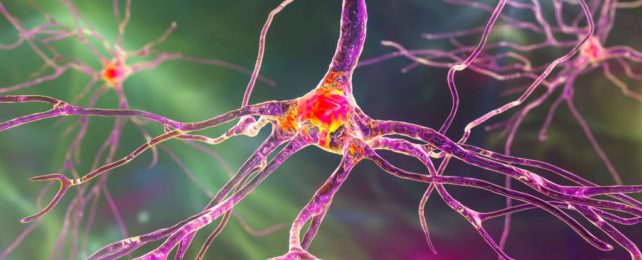Severe COVID-19 looks scarily like old age in the human brain, according to a postmortem analysis of 54 healthy and infected individuals.
The authors of the study say their research is the first to link COVID-19 to molecular signatures of brain aging.
"We observed that gene expression in the brain tissue of patients who died of COVID-19 closely resembled that of uninfected individuals 71 years old or older," says public health scientist Jonathan Lee from Harvard University.
The sample, made up of people in their early twenties to their mid-eighties, includes 21 individuals who had had severe COVID-19, a single asymptomatic individual, and 22 people who were not infected with the coronavirus.
Researchers also compared their results to an uninfected individual with Alzheimer's disease and another group of 9 uninfected individuals with a history of hospitalization or ventilator treatment.
Using RNA sequencing technology on samples of the prefrontal cortex, scientists found those with severe COVID-19 showed enriched genetic expression patterns associated with aging.
The brains of infected individuals looked more similar to older individuals in the control group, regardless of their actual age.
In simple terms, genes that were usually upregulated in aging, like those to do with the immune system, were also upregulated in severe COVID-19.
At the same time, genes downregulated in aging, like those to do with synaptic activity, cognition, and memory, were downregulated in severe COVID-19, too.
"We also observed significant associations of cellular response to DNA damage, mitochondrial function, regulation of response to stress and oxidative stress, vesicular transport, calcium homeostasis, and insulin signaling/secretion pathways previously associated with aging processes and brain aging," the authors write.
"Altogether, our analyses suggest that many biological pathways that change with natural aging in the brain also change in severe COVID-19."
Ever since the novel coronavirus SARS-CoV-2 began to infect humans at a global scale, scientists have feared possible long-term consequences.
Damage to the brain is one of the most problematic outcomes. Severe cases of COVID-19 are often associated with brain fog, memory loss, stroke, delirium, or coma. In October of 2020, initial brain scans on COVID-19 patients revealed worrisome signs of neurological disturbance and impairment.
Later studies have since found even mild COVID-19 can affect the brain, although it is still not clear how long these changes might last or how they compare to those with severe COVID-19.
Every year that passes, health experts have a slightly better idea of the long-term outcomes that this global pandemic might bring. Three years in, it's not looking good.
The findings of the current study follow on the heels of another paper, published earlier this year, that found the cognitive impact of severe COVID-19 is equivalent to about 20 years of aging.
Neuropathologist Marianna Bugiani from Amsterdam University told Nature the new findings open up "a plethora of questions that are important, not only for understanding the disease, but to prepare society for what the consequences of the pandemic might be."
She also added that these consequences might not be clear for many more years to come. And by this time, the global community will probably be suffering from repeat COVID-19 infections.
Who knows how multiple sicknesses will impact our cognitive power in the long run?
Interestingly, in the current study, researchers found no genetic evidence of the SARS-CoV-2 virus in the brains of infected patients, which suggests the neurological consequences of the virus may not be directly due to their presence in the nervous system.
The authors did, however, find evidence that tumor necrosis factor (TNF), which is associated with inflammation, brain aging, and aging-induced cognitive decline, was present at higher levels in the brains of infected individuals.
Genetic factors associated with antiviral immune responses were also elevated.
The authors argue both of these pathways "may lead to significant deteriorating effects in the brain in the absence of SARS-CoV-2 neuroinvasion."
In light of their findings, the team says people who are recovering from COVID-19 should get neurological follow-ups. If the very presence of this novel virus is enough to trigger inflammation in the brain, it's possible that any infected individual is at risk of brain deterioration.
Until experts know more, the authors say doctors and patients should focus on other risk factors for dementia that are in our control, like weight, alcohol consumption, and exercise.
Avoiding future COVID-19 infections to the best of your ability is also probably a good idea.
The study was published in Nature Aging.
